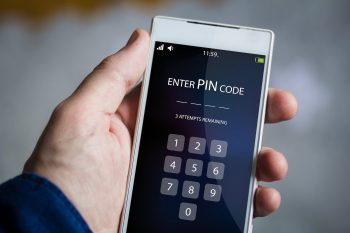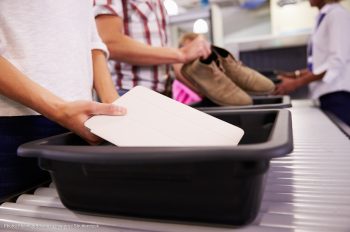March 21st, 2017
Contributing writer for Wake Up World
I don’t know about you, but when I travel, I find going through security and customs to be one of the most unpleasant aspects of the entire journey. After 9/11, security and immigration measures were tightened, and we now deal with airport technology that was unheard of when I was growing up. Long gone are the days of short security lines and breezing through border control.
Today, clearing the US or Canadian border can be its own special kind of hell — especially if you have a foreign sounding name or have traveled to Middle Eastern countries. Investigative journalists and filmmakers also face outrageous ordeals in returning back home to the US.
For all that, yet another disturbing development has me questioning whether it’s worth it to travel at all: border agents demanding you unlock your phone and computer so they can be searched and, possibly, their information copied — even if you aren’t suspected of any wrongdoing. And the searches are increasing. Between 2015 and 2016, the number of smartphone searches at the US border jumped 500 percent, from 4,444 to around 23,000.
[pro_ad_display_adzone id=”110028″]
Border Security, North American Style
Alain Philippon, a Canadian citizen, knows firsthand what it’s like to be bullied and harassed while attempting to protect his privacy. When Philippon landed in Halifax, Canada — after a trip to the Dominican Republic — he was ordered to reveal his password so the agents could search his smartphone. When he refused, Philippon was arrested for obstructing border agents:
“He’s been charged under section 153.1 (b) of the Customs Act for hindering or preventing border officers from performing their role under the act. According to the CBSA, the minimum fine for the offense is $1,000, with a maximum fine of $25,000 and the possibility of a year in jail.” [source]
The CBSA declined to say why Philippon was targeted for the phone search.
A spokesman for the border service said, “Officers are trained in examination, investigative and questioning techniques. To divulge our approach may render our techniques ineffective. Officers are trained to look for indicators of deception and use a risk management approach in determining which goods may warrant a closer look.”
Rob Currie, director of the Law and Technology Institute at the Schulich School of Law at Dalhousie University, points out that border officials have far ranging powers to search travelers crossing the Canadian border, and travelers should have a lowered expectation of privacy.
“Under the Customs Act, customs officers are allowed to inspect things that you have, that you’re bringing into the country,” he told CBC News. “The term used in the act is ‘goods,’ but that certainly extends to your cellphone, to your tablet, to your computer, pretty much anything you have.”
It’s no different in the US, although Canada’s neighbor to the south has added a new twist to the assault against privacy: asking travelers to cough up their social media passwords.
Broad Authority for Search and Seizure
The border of a country is a bit of a no man’s land as far as privacy and freedom are concerned. According to U.S. Customs and Border Protection (CBP):
“All persons, baggage, and merchandise arriving in, or departing from, the United States are subject to inspection, search and detention. This is because CBP officers must determine the identity and citizenship of all persons seeking entry into the United States, determine the admissibility of foreign nationals, and deter the entry of possible terrorists, terrorist weapons, controlled substances, and a wide variety of other prohibited and restricted items. Various laws that CBP is charged to enforce authorize such searches and detention (see, for example, 8 U.S.C. § 1357 and 19 U.S.C. §§ 1499, 1581, 1582).”
Laws are in place that allow border agents to search bags without court approval, in order to establish that security and immigration are in compliance. This authority has also been extended to digital devices.
But privacy activists say searching a digital device is much more intrusive that inspecting a suitcase. The device not only has personal messages and photographs, but could also compromise anyone the owner has been in contact with. This is especially concerning for journalists or professionals such as doctors or lawyers, who are required to protect their sources, patients and clients.
“Before government agents should be able to go rifling through that trove of private data, they should have a very good reason based on individualized suspicion of illegal activity,” said Nathan Freed Wessler, a staff attorney for the American Civil Liberties Union. “People’s most private details of their lives will be made bare without justification.”
This invasion of privacy isn’t just reserved for suspected terrorists or illegal aliens, anyone can be targeted for a random search.
Last January Sidd Bikkannavar, a US-born NASA scientist, was detained at the Houston airport until he unlocked his NASA-issued phone for inspection. He left for South America on January 15th, while the US was still under the Obama administration. Just over a week into the Trump administration, he flew into Houston, Texas from Chile on January 30th. A seasoned international traveler, Bikkannavar was surprised by what greeted him upon arriving at the US border.
Even though he’s a natural-born US citizen and is enrolled in Global Entry — a CBP program where individuals who have gone through extensive background checks are allowed expedited entry into the country — he was detained and pressured by CBP to give the agents his phone and password.
[pro_ad_display_adzone id=”110030″]
Bikkannavar was told he would be detained until he unlocked his phone. He was also given a list of consequences for failure to offer information, one of which was detention and seizure. Because the phone was issued by NASA, there’s a good chance it contained sensitive material that wasn’t intended to be shared. NASA employees are required to protect their work-related information, but Bikkannavar felt he didn’t have any other choice but to unlock the phone.
The officer left with the device and returned thirty minutes later. Bikkannavar eventually was given his phone back, but he has no idea what information may have been copied from the device.
Bikkannavar has no idea why he was singled out — he hadn’t visited any of the countries listed in the immigration ban and has worked for NASA’s Jet Propulsion Lab — a US federal agency — for 10 years.
“I don’t know what to think about this,” Bikkannavar recently told The Verge in a phone call. “… I was caught a little off guard by the whole thing.”
Where to now?
The CBP is authorized to seize and copy any electronic device coming through the border. Some believe spyware is often installed without the owners knowledge during these inspections. And it looks like the invasion of privacy is about to get worse.
Last February, Homeland Security secretary John Kelly made an official statement saying people visiting the United States may soon be required to surrender their social media passwords.
“We want to get on their social media, with passwords: What do you do, what do you say?” he told the House Homeland Security Committee. “If they don’t want to cooperate then you don’t come in.”
Sophia Cope, a staff lawyer for the Electronic Frontier Foundation adds that, while the policy doesn’t yet apply to citizens, it would be “a very small step for them to start doing that to Americans, as well.”
Security and privacy can co-exist. If you value your privacy and would like to maintain it, Lew Rockwell outlines several steps you can take to protect against warrantless border searches, as does Wired.
Article sources:
- www.cbp.gov/sites/default/files/documents/inspection-electronic-devices-tearsheet.pdf
- www.businessinsider.com/can-us-border-agents-search-your-phone-at-the-airport
- www.nytimes.com/…/business/border-enforcement-airport-phones.html
- www.lewrockwell.com/…/mark-nestmann/protect-warrantless-border-searches
- www.wired.com/…/guide-getting-past-customs-digital-privacy-intact
- www.techdirt.com/…/canadian-borader-patrol-charge-traveler-with-obstruction-refusing-to-give-up-his-phone-password
- www.theverge.com/…/nasa-sidd-bikkannavar-detained-cbp-phone-search-trump-travel-ban
Recommended articles by Carolanne Wright:
- Psychiatric Industry Corruption: 6-Year-Old Boy Committed to a Psych Ward for Throwing a Temper Tantrum at School
- Renowned Harvard Psychologist Says ADHD is Largely a Fraud
- Plastic-Eating Mushroom Discovered in the Amazon Rainforest — A Solution for Our Trash Saturated World?
- Over 100 Scientific Studies Agree: Cannabis Annihilates Cancer
- Why Every Parent Should Consider Unschooling
- First U.S. City Produces More Electricity Than It Uses — With 100% Renewable Technology
- If You Care About Animals and the Earth, Here’s Why You Need to Boycott Palm Oil Immediately
- Brain Waves and Binaural Beats: A Gateway to Higher Consciousness, Enhanced Learning and Brain Function
- 85% of Tampons, Pads and Other Feminine Care Products Contaminated with Monsanto’s Cancer-Causing Glyphosate
- Latest Research on CBD Oil Offers New Hope for Healing Leaky Gut Syndrome and Autoimmune Disorders
- Scientific Breakthrough: Alzheimer’s Ultrasound Therapy Fully Restores Memory Function in Mice
[pro_ad_display_adzone id=”110025″]
[pro_ad_display_adzone id=”110027″]








